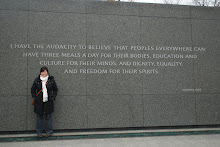(See post below this for Part I)
At times, believing in Abundance seems like a pipe dream. The very word "Abundance" flies in the face of the world's shrinking resources and is a naive denial of human exploitation and greed. Why hold on to a word best left to idealists and the rich? The wealthy can afford to talk about Abundance (like the word "blessing," it can be a great justification for their privilege), but what about those who are directly affected by the realities of "Not Enough?"
There are too many such Realities: soil depletion, oil addiction, global warming, hunger, water scarcity. They all grapple to claim our immediate and necessary response like the recent images of hands fighting over aid after Pakistan's floods. Some respond by producing more. That makes sense on a very basic level; there's not enough to go around, so let's make more of what is lacking. Others respond by trying to correct the inequities and injustices involved in the distribution of resources. This is a necessary step toward addressing the real causes of poverty, but I do not believe it is Abundance. True Abundance is not simply a matter of production or distribution, nor the magnitude of either of these two economic pillars. Abundance is the invisible support in the Great Economy, as Wendell Berry calls it, and though it is hard to define, control, or plug into an equation, I believe it is Creation's cornerstone.
The Abundant Table Farm Project, where I spent the last year as a farm intern harvesting, planting, and distributing the bounty of 5 organic acres, was the growing ground for community conversations around Abundance. From these, I distilled a few starting-points for definition of this foundation to Creation.
1. Abundance includes a transformational perspective and orientation to how the world naturally is. It is not simply ethereal, however, but is an embodied way of living and being in this creation that both witnesses to and creates a greater reality than the realities of over-exhausted and limited resources.
2. Given the above, it is helpful to think of the byproducts of Abundance as material. Like Eric's bio-diesel soap, however, I believe Abundance is often created out of what the dominant system would consider waste.
3. Abundance happens in times and places of seemingly limited resources. Our tomatoes were not setting well, and we worried we would not have enough to give our CSA members as promised. Then, another CSA farmer visited our farm. He had an over-load of tomatoes, but no beans. A quick barter for our plentiful beans, and we soon had enough for all to be satisfied. Rather than competition being the rule for an economy built upon scarcity, Abundance completely reverses the capitalist game. There is more than enough for all - but we must first know our place and its residents well enough to have eyes that see the potential for abundance there.
4. Reciprocity is the name of the game - partakers in Abundance are also givers. Vegetable bearers are sent away full of white sea bass to share. The disciples' baskets of bread and fish in the Mark 6 story are returned not empty, but overflowing with more than enough (thank you to Ched Myers for Bible Studies that illuminated this and other feeding stories).
5. Abundance is closely related to limits. At one point, our little farm doubled from 60 to 120 CSA (Community Supported Agriculture) members in one season. We were producing more than ever, but I do not believe we were experiencing abundance. Our community life was stretched thin and our bodies overly exhausted. Limits also apply to the life of the land, not just its occupants.
6. Abundance is the closest word I know to the meaning of the wide word "shalom," which Paul struggled to express in different ways. Abundance extends to right/ just relationships with earth, people, animals, and ultimately, with God. If you had not already guessed, then, it is really difficult to completely define or encompass. But you know it when you see it!
Like Eric and Christine's family, I pray that we too may be people of Abundance, who transform waste into purpose, create relationships of mutuality and provision in community, "free-dive" into the place where we live to know it well, and join together to obey Christ's command to feed and to eat there in the face of scarcity. It is to this urgent and joyful discipleship that we are called in the midst of grim realities, that all may have Abundant Life.
Subscribe to:
Post Comments (Atom)




2 comments:
This is beautiful, Kat..."free-dive" into the place where we live to know it well.
Yes.
Thanks, Kat. This is very thoughtful and definitely worth the close read. I hope to talk with you more about it.
Post a Comment